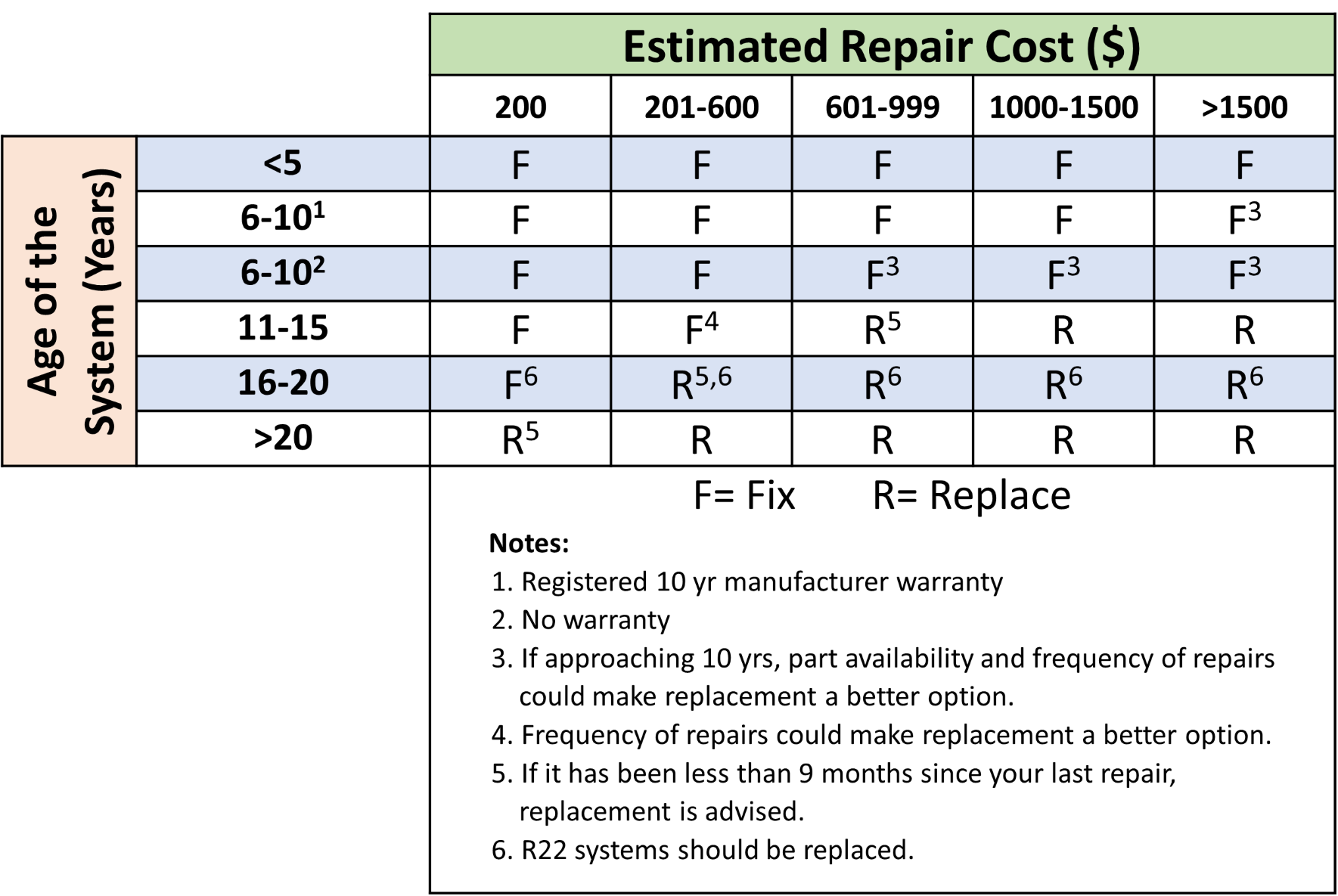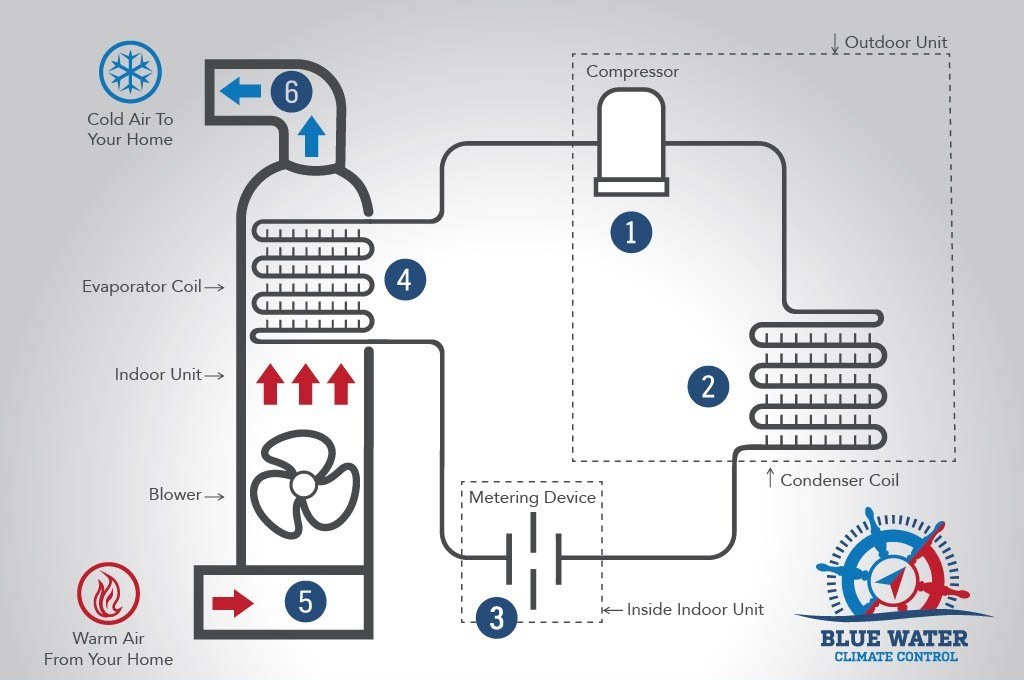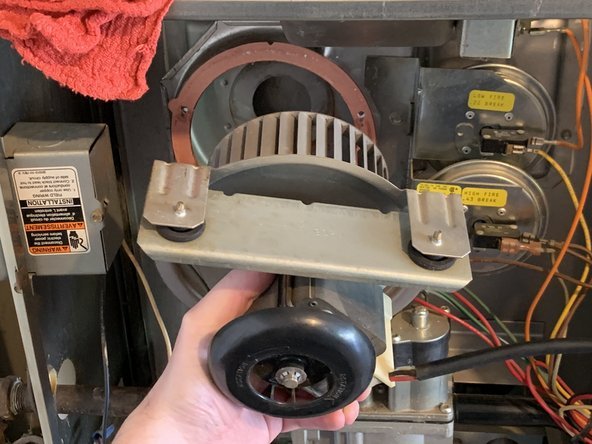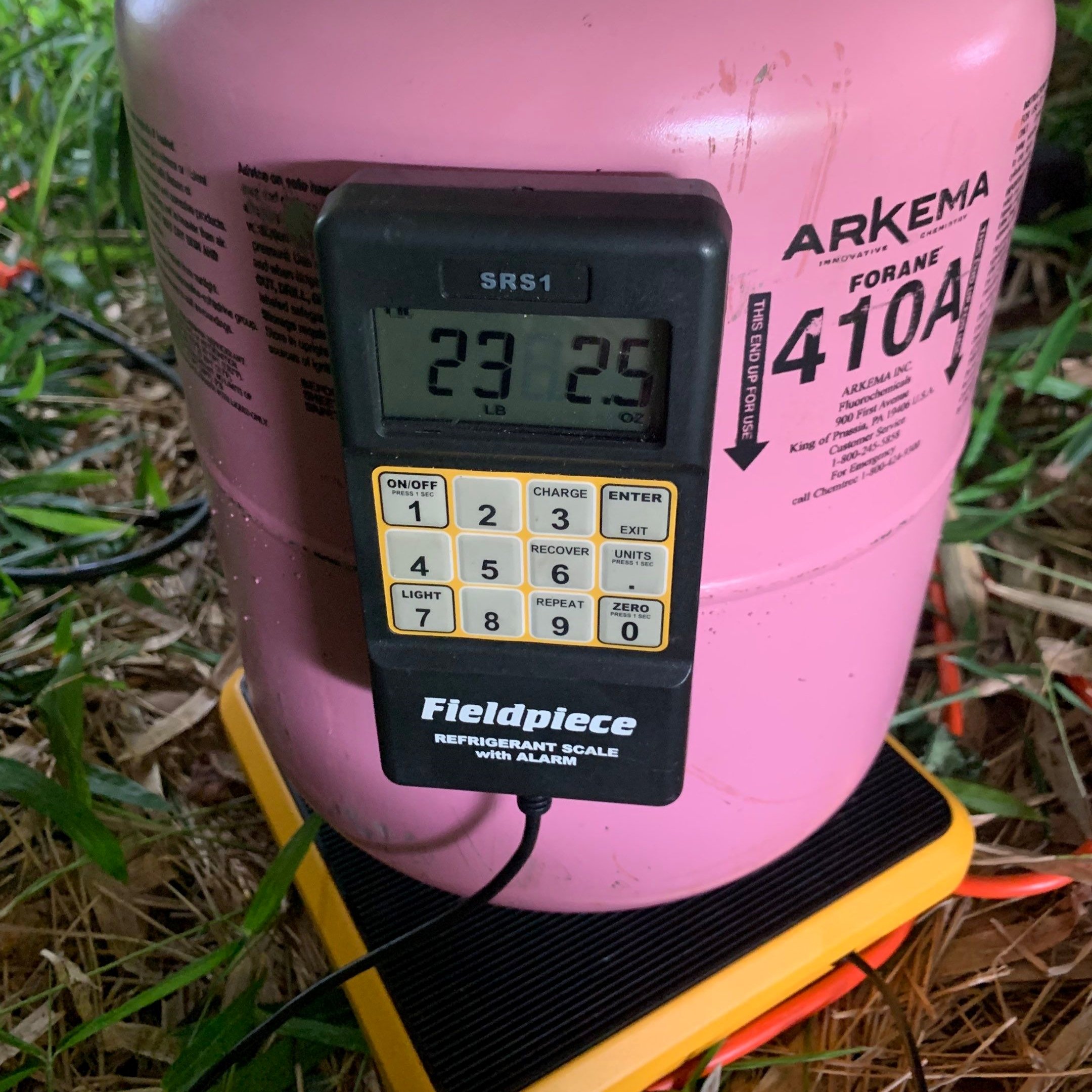HVAC Repair Vs Replace Chart for 2025
The HVAC Repair or Replace Chart for 2025
The following graph is based on the average replacement cost for a 3-ton heat pump split unit. The estimated repair cost, total cost, and type of unit each affect the recommendation. Neglected systems could need to be replaced earlier than anticipated. This graph should be used as a guide only.
HVAC Cost vs. Age and Condition: Repair or Replacement Guide.
How to use the guide
Recommendations are based on average payments using traditional financing vs. the ongoing cost of maintenance and repair combined with increased utility bills, including potential HVAC repair costs.
Step 1: Find the row that represents the age of your system and whether or not the system has a warranty. If the age is greater than 5 years, consider that only repair costs may apply if the unit is still under warranty, focusing mainly on labor expenses.
Step 2: Find the column that represents the cost of the repair that you’ve been quoted.
Step 3: Find where the row and column intersect. If it is an “F”, we recommend Fixing the existing system. If it is an “R”, we recommend Replacing the system you have.
Explanation of the notes:
Notes 1 and 2: Standard HVAC system warranties cover all parts up to 5 years. If the unit was registered, it can be extended to 10 years. Some brands extend to 12 years and even lifetime on some components. But ONLY if it is registered. HVAC technicians are able to look up warranty information using the serial number.
Note 3: If your system is approaching 10 years and due to lack of care or environmental conditions, it has already started causing regular trouble, you might want to consider a replacement for a high-cost repair.
Notes 4 and 5: The age and condition of your system combined with frequency of repair is becoming more costly than it would be to replace your system.
Note 6: If still have a system that is using R22, it needs to be replaced. Putting aside the environmental concerns, the cost of maintaining it is far beyond what a new unit will be.
Understanding Your Air Conditioning Unit
Your HVAC system is a complex network of components that work together to provide heating, ventilation, and air conditioning to your home. Understanding how your system operates is crucial for making informed decisions about repairs and replacements. A typical HVAC system consists of several key parts:
Furnace: This component is responsible for heating your home. It burns fuel (such as gas or oil) to generate heat, which is then distributed throughout your home via ductwork.
Air Conditioner: The air conditioner cools the air in your home. It uses a refrigerant to absorb heat from the indoor air and release it outside, providing a cooling effect. Electrical components carry high voltage, making it risky to handle DIY repairs.
Thermostat: The thermostat regulates the temperature in your home by controlling the operation of the furnace and air conditioner. It allows you to set your desired temperature and maintain a comfortable indoor environment.
Ductwork: The ductwork is a system of ducts that distribute conditioned air (heated or cooled) throughout your home. Properly sealed and insulated ducts are essential for efficient HVAC system performance.
By understanding these components and their functions, you can better assess when your HVAC equipment needs repairs or if it’s time for a replacement.
What is an HVAC System?
An HVAC (Heating, Ventilation, and Air Conditioning) system is a sophisticated network designed to regulate the indoor climate of your home. It ensures a comfortable environment by controlling temperature, humidity, and air quality. A typical HVAC system includes a heating unit, such as a furnace, a cooling unit like an air conditioner, a ventilation system to circulate air, and a thermostat to manage the system’s operations. Understanding the components and functions of your HVAC system can help you make informed decisions about maintenance, repairs, and replacements.
Signs Your HVAC System Needs Attention
If you notice any of the following signs, it may be time to have your AC system checked by a HVAC Specialist:
Increased Energy Bills: A sudden spike in your energy bills could indicate that your HVAC system is not operating efficiently. This inefficiency could be due to various issues, such as a failing component or a need for maintenance.
Reduced Airflow: If the airflow from your vents is weak or reduced, it could signal a problem with your ductwork or air conditioner. Blockages, leaks, or failing components can all contribute to reduced airflow.
Unusual Noises: Strange noises coming from your HVAC system, such as banging, clanking, or hissing, can indicate a problem with the electrical components or compressor. These noises should be investigated promptly to prevent further damage.
Leaks: Water leaks or refrigerant leaks can cause significant damage to your HVAC system and increase your energy bills. Leaks should be addressed immediately to avoid costly repairs.
Temperature Fluctuations: If your home is not maintaining a consistent temperature, it could be a sign that your thermostat or HVAC system needs attention. Inconsistent temperatures can result from various issues, including failing components or improper system calibration.
Recognizing these signs early can help you address potential problems before they become major issues, ensuring your HVAC system operates efficiently and effectively. The age of the system plays a significant role in the frequency and cost of these repairs. Efficiency and reliability also vary depending on age. If the HVAC system has not been regularly maintained during its lifespan, more frequent and costly repairs can be expected along with increased cooling costs.
Age and Reliability
The age and reliability of your HVAC system are critical factors when deciding whether to repair or replace it. As HVAC systems age, their efficiency tends to decline, leading to higher energy costs and more frequent breakdowns. Typically, a well-maintained HVAC system can last between 10 to 20 years. However, factors such as usage patterns, operating conditions, and advancements in technology can impact its reliability. Regular maintenance can extend the lifespan of your system, but if you find yourself frequently dealing with repairs, it might be time to consider a replacement to ensure consistent performance and energy efficiency.
Evaluating Repair Costs
When faced with HVAC repairs, it’s essential to weigh the costs against the benefits. Repair costs can quickly add up, especially for older systems. A common guideline is to consider replacing your HVAC system if the repair cost exceeds 50% of the cost of a new system. However, this decision should also take into account the age, efficiency, and overall condition of your current system. Investing in a new, more efficient HVAC system can lead to long-term savings on energy bills and reduce the frequency of future repairs.
System Failures and Repair Costs
System failures can be both inconvenient and expensive, particularly during extreme weather conditions. Common issues include failures of electrical components, refrigerant leaks, and compressor malfunctions. Electrical components, such as capacitors and contactors, often fail due to high internal temperatures and electrical stress. Refrigerant leaks can be challenging to locate and repair, leading to significant costs. Compressor failures are among the most expensive repairs, especially if your unit is no longer under warranty. Understanding these potential issues can help you make informed decisions about whether to repair or replace your HVAC system.
The Importance of Maintenance
Preventative maintenance is essential for ensuring the longevity and efficiency of your HVAC system, particularly the condenser fan motor. Regular maintenance is crucial to extending the life of your HVAC system and preventing costly repairs. Here are some reasons why maintenance is essential:
Reduces Repair Costs: Regular maintenance can help identify potential problems before they become major issues, reducing the need for costly repairs. By addressing minor issues early, you can avoid more significant and expensive repairs down the line.
Improves Efficiency: A well-maintained HVAC system runs more efficiently, reducing energy costs and saving you money. Regular maintenance ensures that all components are functioning optimally, which can lead to significant energy savings.
Extends System Life: Regular maintenance can help extend the life of your HVAC system, delaying the need for replacement. By keeping your system in good working order, you can maximize its lifespan and get the most out of your investment.
Improves Indoor Air Quality: A well-maintained HVAC system can help improve indoor air quality by removing pollutants and allergens from the air. Regular maintenance includes cleaning and replacing filters, which can significantly enhance the air quality in your home.
By understanding your HVAC system, recognizing signs of trouble, and prioritizing maintenance, you can ensure your system runs efficiently and effectively, providing comfort and savings for years to come.
Band-aid Repairs
As mentioned earlier, there are many times when it is appropriate to recommend an HVAC replacement over repair. Repairs on older systems or replacement of non-warranty parts can be very costly. In these cases, homeowners may choose a repair option to get a little more out of the unit. In this case, the homeowner has to weigh the pros and cons including reduced energy efficiency and the estimated repair cost.
If the temporary repair doesn’t last very long, the homeowner could be out the additional repair cost.
Refrigerant leaks are a case where it is often recommended to replace the HVAC system. Choosing to continually fill a unit with low refrigerant and a known leak is not authorized by EPA regulations.
HVAC installation costs spread out over time with a finance option are typically less expensive than keeping an old HVAC unit running.
When Replacement Makes Sense
Age is the driving factor in replacing your cooling system that works but is breaking down regularly. Upgrading to a newer system can significantly enhance comfort levels in your home, especially if the current unit struggles to maintain comfortable temperatures. Upfront HVAC replacement costs can easily be overcome in energy savings. If your HVAC unit is older than 15 years and you are repairing once per year, it might be time to invest in a new unit.
HVAC replacement costs start as low as $6,000 depending on the system specifications, type of unit (package unit, split, ductless, heat pump, natural gas), and home configuration.
Homeowners can expect to recoup many air conditioner installation costs through a system with higher energy efficiency. When coupled with a programmable thermostat, homeowners can be energy-conscious and save on operating costs.
Choosing the Right New HVAC System
The central AC unit is the largest, most expensive appliance in your home. When a homeowner needs an HVAC installation, they are planning to make an investment that will last for the next 10-15 years. When an HVAC professional comes out to provide a cost estimate, the homeowner expects to best return on investment possible.
The new HVAC unit must meet the specific heating and cooling needs of the home. This is why it's so important to perform a load calculation before an HVAC installation. If the new HVAC equipment is under or oversized, the energy efficiency of the AC unit and the comfort of the home will suffer.
The second biggest driver of installation costs is the efficiency of the new unit. Energy efficiency is measured in SEER or AFUE. SEER measures the cooling efficiency. AFUE is the efficiency of the gas furnace. Most homeowners want multiple efficiency options on their price quote.
Efficiency Ratings and Features
When evaluating an HVAC system, efficiency ratings and features are crucial considerations. Higher efficiency ratings can result in substantial energy savings and lower energy costs. Look for systems with high SEER (Seasonal Energy Efficiency Ratio) and AFUE (Annual Fuel Utilization Efficiency) ratings, as these indicate better performance. Additionally, consider features like programmable thermostats, zoning systems, and air purification systems, which can enhance the overall efficiency and comfort of your home. Investing in a high-efficiency HVAC system can provide long-term benefits, including reduced energy consumption and improved indoor air quality.





